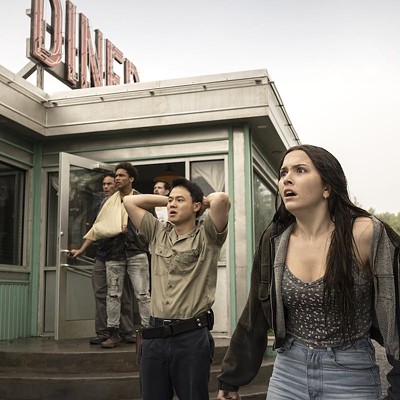A hotel bomb has detonated, killing its intended target, but the impact also blew out the wall of the young couple in the room next door. Amid body parts and debris, the girl is frantically complaining to her boyfriend that she’s been blinded. Immediately we’re back into the planning stages of the Mossad operatives, who are discussing how they can build a more precise explosive. There’s no room for grief in the business of death. Steven Spielberg’s Munich uses serious political inquiry to up the stakes on espionage movie intrigue, culminating in moments of abject horror. Even though it’s set in the 1970s, and looks like a movie from that decade (including the use of photographic zooms), it’s a major cinematic achievement of present vitality — reflecting the experienced uncertainty of an era shaken by international terror. It’s inspired by the real event (and George Jonas’ subsequent book Vengeance) in which five agents were assembled to find and kill the men responsible for planning the Palestinian murder of 11 Israeli athletes at the 1972 Summer Olympics.
The group’s leader is Avner (Eric Bana), selected because he’s unremarkable enough to be difficult to trace. Spielberg’s technique is to engross with their Bourne Identity-genre exploits, only to shock us into despair as the pool of blood gets deeper. It’s political history given the emotional conscience missing from news item reports. Although the speechifying is handled without stalling Munich in exposition, Spielberg’s capacity to express complex ideas visually has no equal: At one point, Avner is framed against a balcony in the precise fashion of earlier news footage of a Black September terrorist. Munich traces a history of violence sprawling into 9/11 and beyond. Spielberg keeps it in human terms, paralleling global chaos with the corrosion of a man’s soul.
Casanova
The common perception of Giacomo Casanova has little in common with the reality of the 18th-century adventurer. Lasse Hallstrom’s Casanova builds the myth even further, but it never aspires to any ruse of historical importance. Truth is, the lies in this colourful romantic farce have Hallstrom in a more honest place than he’s been in ages. (Anybody still feel like declaring the artistic worth of Chocolat?) With the spectacular Munich in theatres, that isn’t saying a lot. The light-footed pleasures of Casanova aren’t for raving about, just for smiling at.
Casanova claims to have had 10,000 lovers in his day. As played with supreme self-justification by Heath Ledger, the character is approachable as an idealized hero more than as an identifiable one. With sights set on the virginal Victoria (Natalie Dormer) and the women’s rights advocate Francesca (Sienna Miller), who deplores what she knows about Casanova, he’s forced to hide his real identity. This task becomes more convoluted when he’s asked for romantic help from two men, each of whom is enamoured with these women. The web of deceit has energy and charm, although the screenplay by Jeffrey Hatcher and Kimberly Simi isn’t funny enough to be really special. Additionally, happy coincidence is relied upon so that the movie needn’t ensure the lead character’s goal makes sense. When Casanova is striving to be liked by his new male friends, he’s working against his own sexual pursuits. It’s the taste for old-fashioned movies that saves it. Alexander Desplat’s music is a throwback to silent-era film scores. And a scene of Venice’s Carnivale, which sets a hot air-balloon ride against a firework-filled night sky, has a storybook magic.
Old-Fashioned: [email protected]













